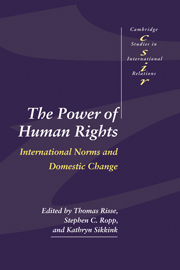Book contents
- Frontmatter
- Contents
- List of contributors
- Preface
- 1 The socialization of international human rights norms into domestic practices: introduction
- 2 Transnational activism and political change in Kenya and Uganda
- 3 The long and winding road: International norms and domestic political change in South Africa
- 4 Changing discourse: transnational advocacy networks in Tunisia and Morocco
- 5 Linking the unlinkable? International norms and nationalism in Indonesia and the Philippines
- 6 International norms and domestic politics in Chile and Guatemala
- 7 The Helsinki accords and political change in Eastern Europe
- 8 International human rights norms and domestic change: conclusions
- List of references
- Index
- Cambridge Cultural Social Studies
4 - Changing discourse: transnational advocacy networks in Tunisia and Morocco
Published online by Cambridge University Press: 07 December 2009
- Frontmatter
- Contents
- List of contributors
- Preface
- 1 The socialization of international human rights norms into domestic practices: introduction
- 2 Transnational activism and political change in Kenya and Uganda
- 3 The long and winding road: International norms and domestic political change in South Africa
- 4 Changing discourse: transnational advocacy networks in Tunisia and Morocco
- 5 Linking the unlinkable? International norms and nationalism in Indonesia and the Philippines
- 6 International norms and domestic politics in Chile and Guatemala
- 7 The Helsinki accords and political change in Eastern Europe
- 8 International human rights norms and domestic change: conclusions
- List of references
- Index
- Cambridge Cultural Social Studies
Summary
Introduction: the emergence of transnational networks and human rights discourse in the Maghreb
In the Maghreb region, human rights became an important public theme during the 1980s. Here, international human rights norms were not interpreted in opposition to the shared cultural-political understandings of Arab societies as some scholars proposed (Huntington 1996). In all Maghreb core states, Tunisia, Algeria, and Morocco, human rights were not rejected as purely Western ideas or values. Instead, these norms were interpreted as compatible with the Islamic culture. North African intellectuals even tried to relate the human rights idea to the Islamic religion (Jürgensen 1994). Insofar as human rights are well-recognized universal values they could be used as a moral reference system by societal actors in North African states to criticize norm-violating state behavior. The political background of these new political actors was their knowledge about and their reference to the international human rights regime.
Public debate over human rights started when North African state leaders responded to public demands for political participation with measures of security control and tried to deal with socioeconomic problems by increasing state repression in the 1970s and 1980s. New political actors set the question of human rights on the agenda, challenging the legitimacy of the repressive governments. These non-governmental actors did not seek political power or to overthrow the system. Rather, they wanted to change the operating rules of national politics through public persuasion and communication processes. As Susan Waltz (1995a) pointed out, the contribution of these actors to North African politics has been substantial.
- Type
- Chapter
- Information
- The Power of Human RightsInternational Norms and Domestic Change, pp. 109 - 133Publisher: Cambridge University PressPrint publication year: 1999
- 15
- Cited by

